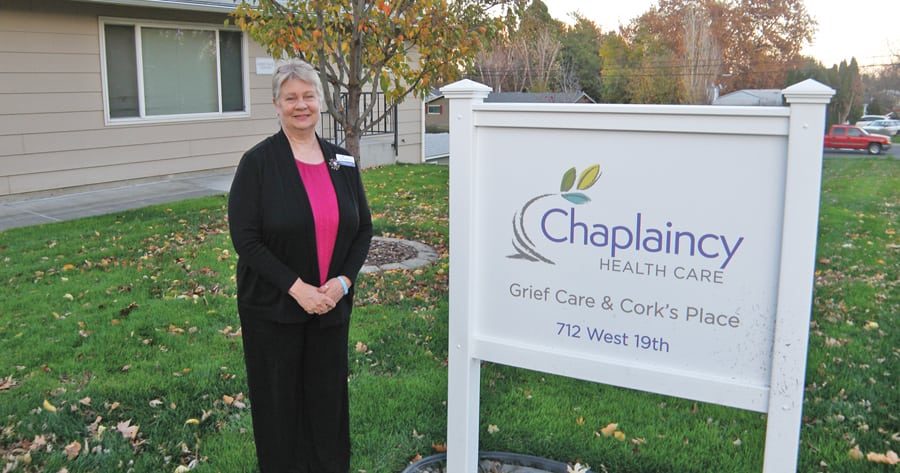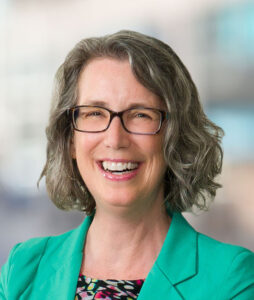
Home » Holidays bring joy, but also loneliness to those grieving loss of loved one
Holidays bring joy, but also loneliness to those grieving loss of loved one

December 21, 2016
A Richland woman dreaded the holidays after losing her daughter to leukemia.
She didn’t want to celebrate. She didn’t want to keep up the same traditions.
She wanted space to feel her grief.
And to remember.
Sandy Fishback, 69, credits a Chaplaincy Health Care class with empowering her to feel her grief during the holidays.
The death of her daughter and what she learned in the Hope for the Holidays class changed her life in countless ways but perhaps the most important one is how it helped her to be a better person. She now regularly gives to charity to “put good out in the world.”
“I do more random acts of kindness…with her in mind,” Fishback said.
The class also gave her permission to “do what I thought was right, versus being locked into, ‘You’re the mom and you have to invite these people for Thanksgiving and Christmas.’ I didn’t want to and didn’t,” she said.
Wanda Kontur, a grief specialist at Chaplaincy Health Care, said the agency’s classes and support groups give those experiencing grief strategies to celebrate the holidays the way that works best for them, even if it means not celebrating.
“The expectation that it’s supposed to be a happy or family time was how it was constructed before. But there’s this hole that the family doesn’t want to talk about now. They don’t know how to talk about it. It’s kind of like the elephant in the room,” Kontur said.
Kontur said the time leading up to the holidays can last up to three months and the “anticipation of the day is a lot worse than the day can actually can be” and consequently the day after can be the hardest after so much stress and buildup.
“The more they know what to expect when they go into the day or week is good, otherwise it’s big and nebulous and kind of smothering. You have choices and things you can do,” Kontur said.
Kontur said having a conversation with family is key.
It’s what Fishback and her husband Roger decided to do. They opted to create new traditions to honor their daughter, Dana, who died at age 31 eleven years ago.
They no longer put up their Christmas tree and instead decorate Dana’s smaller four-foot tree with her snowman-themed ornaments and nativity set.
Her parents also each take time to write her a letter on Christmas Eve.
“That class empowered me and gave me permission to change things. Just because society says moms are supposed to do this and that doesn’t mean you have to,” she said.
Fishback said she leaned heavily on the classes after Dana’s death.
She also attended the agency’s other grief classes and groups, “Understanding Grief: An Introduction,” “Coming to Terms with Loss” and the “Grieving Parents’ Support Group.”
She also was involved in The Compassionate Friends, a national group for parents who lost children, for nine years, serving for six years as a co-facilitator.
Among the things she’s learned along the way has been to honor her grief.
She also chooses to remember Dana while doing charity work.
For 11 years she’s been creating a “birthday party in a bag” to drop off at the Richland Food Bank on Dana’s birthday.
She fills 10 cheery bags with cake mix, oil, frosting, candles, cups, plates, napkins, a toy and balloons about a week before her daughter’s special day.
“In my little pretend world, someone is going to have a birthday the same day as her,” she said.
Twice a year, she and her husband donate the money they would have spent on Dana’s birthday and Christmas gifts to charity.
Kontur said including children and grandchildren during the holidays and anniversary dates benefits them. She said they’re often the “forgotten mourners.”
Grief is hard on the elderly, too, she said.
“The older generations were taught to pull yourself up by your bootstraps and you don’t cry in front of people. You have to be strong for everybody else. It’s a myth. We have a misunderstanding of what strength is. It’s not: I won’t cry, break down, or let grief get the best of me. It’s redefining strength and why it’s important to do it in ways it works for you,” Kontur said.
She described grief as “always moving and trying to be expressed because that’s its nature and when we do that, we can heal and it becomes manageable.”
The Chaplaincy classes help to “normalize” the big feelings that accompany grief because they’re universal, she said. It helps people to know they can be angry, sad and relieved, all at the same time.
“As people are aging and slowing down physically, that emotional and spiritual stuff starts coming up and people need an opportunity to address it,” Kontur said.
For Fishback, it means regularly lighting a red candle which glows in a vase used at Dana’s memorial service while her love for her daughter glows in her heart.
Ways to honor loved ones
Here are some ideas to honor and remember the person who died, courtesy of The Dougy Center, a Portland-based agency for grieving children and their families.
- Light a memorial candle. Invite children and other family/friends to share memories.
- Write a card or letter to the person who died.
- Write memories on strips of paper and use them to create a chain.
- Hang a special decoration in memory of the person, such as a wreath or stocking. If a stocking is used, family members can place cards or pieces of paper with memories inside.
- Buy a gift the person would have liked and donate it to a charity.
- Gift wrap a box and make an opening in the top for family and friends to share written memories. At a special time the box can be unwrapped and the memories shared.
- Set up a special memorial place at the table during a holiday meal.
- Create a memorabilia table or corner for photos, stuffed animals, toys, cards, food and other mementos.
- Share one of the person’s favorite foods or meals. Food can be a great spark for sharing memories.
Chaplaincy Health Care’s winter grief support groups, classes
Coming to Terms with Loss
6 to 7:30 p.m. Tuesdays, Jan. 10 to March 14 at the Entiat Facility, 2108 W. Entiat Ave., Kennewick.
Fee: $127 with reduced fee option.
This educational and supportive group is open to adults experiencing grief after the death of a loved one.
Call 509-572-0593 or 509-783-7416 ext. 2060.
Widowed Support Group
6 to 7:30 p.m. Wednesdays, Jan. 11 to March 15 at the Entiat Facility, 2108 W. Entiat Ave., Kennewick.
Fee: $127 with a reduced fee option.
This group welcomes widows, widowers and partners experiencing grief after the death of their loved one.
Call 509-572-0593 or 509-783-7416 ext. 2060.
Grieving Parents’ Support Group
6 to 7:30 p.m. the second and fourth Wednesdays every month in 2017 at the Spaulding Facility, 1480 Fowler St., Richland.
Fee: $10 per session with a reduced fee option.
This group is available for adults experiencing grief after the death of a child at any age.
Call 509-572-0593 or 509-783-7416 ext. 2060.
Men’s Loss Support Group
11:30 a.m. to 1:30 p.m. the first and third Fridays of every month at Sterling’s Restaurant, 3200 W. Clearwater Ave., Kennewick.
Fee: $10 per meeting with a reduced fee option.
This group provides a safe and supportive environment for men to process grief related to losses experienced in their lives. It explores methods that help to identify, access and express those losses in healthy, productive ways.
Call 509-380-4587.
For more information on Chaplaincy Health Care visit chaplaincyhealthcare.org.
Local News
KEYWORDS december 2016




